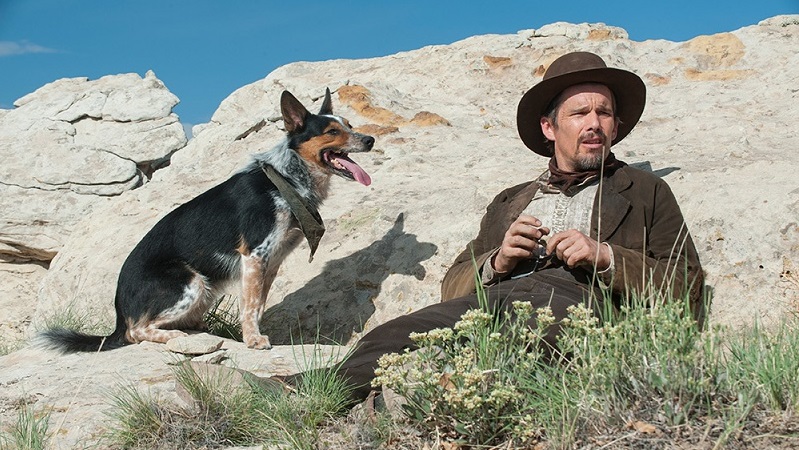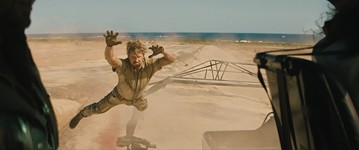With Ti West In a Valley of Violence
Director on PTSD, Westerns, and the world's greatest dog
By Richard Whittaker, 10:00AM, Fri. Oct. 21, 2016

The Western is a forgery. There are white hats and black hats, and bullets leave no blood. Not in In a Valley of Violence, the new revisionist horse opera from writer/director Ti West. He said, "You're forced to see what violence really is. It's your friend, dead in a tub. It's not a movie moment."
It's a classic Western setup: A stranger (Ethan Hawke) and his dog arrive in a remote town, where the marshall (John Travolta) warns him off, and bloody conflict is inevitable. But in West's off-kilter desert, it's not a straight path to justice. It's a spinning top, crashing out of control and taking everyone with it.
The film received its Austin debut during SXSW, just over a decade since West's debut feature The Roost got its world premiere at the same festival. "2005 here changed my life," said West. "I blame (former SXSW Film Conference producer) Matt Dentler for my career. As someone who had nothing to do with the film industry at all, and then makes a movie thanks to [indie auteur] Larry Fessenden, and then comes down to Austin with a backpack full of postcards and fliers that I'd Xeroxed on my dad's copier when I could steal paper, and then have that movie be at the original Drafthouse, and then to be back now, there's nowhere I'd rather be."
After his breakout creature flick, West has been tagged as a horror director, venturing into occult shocker (The House of the Devil), ghost story (The Innkeepers), and most recently, the cult thriller (The Sacrament).
In part, that's the film West is bouncing away from for Valley. He said, "I made The Sacrament, which is a fake documentary. That was a movie that was really about a bleak, grim sense of realism, and I really wanted to do something that was the polar opposite of that. I wanted to do something that was traditionally cinematic. You go from this movie where it's about the camera seeming part of it, and I don't want to do that again. I want to make a movie where the camera is the traditional way of storytelling in cinema, and for me the number one genre for that is the Western."
Yet In a Valley of Violence arguably harkens back to his little-seen second feature, Trigger Man. Like that, Valley takes the sheen and mystique off movie bloodshed. "The movie is about how violence affects people, and how, once it starts, it's very hard to stop it."
Austin Chronicle: Talking with Craig Zahler about his Western Bone Tomahawk, and he said the best asset he had was Kurt Russell, because he knows so much about the West, you could drop him in 1890s Wyoming and he'd be fine.
Ti West: You know what's also cool about Westerns? Everybody wants to be in them, but there's not that many of them. So actors are like, "Dude, let's make a Western," and I feel the same way as a filmmaker. It's fun to write a Western and have people go, "Yeah, I wanna do that, let's get on some horses and get crazy."
AC: There are two ways a Western can go: totally historically authentic, which can send you down a rabbit hole of how clean is your gun, and then there's this grand cinematic history. Which were you going for?
TW: This was by no means a movie where I was trying to be historically accurate, or feel like the "old man" Western, where it's really quiet. I love Open Range, but I didn't want to make that. I guess it's a little more like a spaghetti Western.
For me, the plots of my movies are never important. It's all about the esoteric details, and it's more about, how is this repositioned? Things that I feel when I watch a movie of, "You know what I've never seen in these is blank" and then that's when the wheels start turning for me. So I wanted to make a movie about a traditional revenge setup, with a little bit of a twist, where all these characters in this violent revenge Western are in way over their heads, and to see what that's really like.
You can walk down Sixth Street and see someone get drunk and talk shit, and be the biggest wimp on the street. That's interesting to me, that the guy with the loudest mouth is afraid of everybody, but that's why he's actually scary. The actual tough guy's not scary, because they're just, "I'm living my life." So to me, the Western being filled with the big dog characters, I wanted to make a movie where these characters get involved with something, and then it comes back to haunt them.
AC: And Ethan's character, Paul, is extremely broken before any of this starts.
TW: What Ethan and I talked about was that, we always knew this, but somewhere halfway through shooting the movie I looked at him and said, "You talk to a dog, alone, in every scene. You're a crazy person." If you see this movie twice, you'll go, "Wait, this is super-weird. There's scenes with a guy and a dog, and they're talking, but it's a dog." When that sinks in, it's like, oh, this person's checked out.
When I first brought it to him, I said, "It's really that your character has PTSD, but from a war that nobody thinks about having PTSD from." The Indian Wars, the Civil War, we don't think about that, because it's too far removed from where we are. But it's no different than what's happening now. You go, and you do that, and you get all fucked up, and you can't just fix that.
AC: So let's talk about the real star of the movie: Jumpy the dog. That is one charming canine.
TW: And that's nothing until you meet that dog in real life. 90 percent of what he can do, we couldn't put in the movie because it's too outrageous. The furthest I could go was when he wrapped himself up in the blanket. Any further than that and people would check out, but that's nothing. The dog could walk across the street on its back legs and open the saloon doors with its paws. The dog could understand English. It's the most incredible animal I've ever worked with.
In a Valley of Violence is in theatres now. For review and screenings, visit Film Listings.
A note to readers: Bold and uncensored, The Austin Chronicle has been Austin’s independent news source for over 40 years, expressing the community’s political and environmental concerns and supporting its active cultural scene. Now more than ever, we need your support to continue supplying Austin with independent, free press. If real news is important to you, please consider making a donation of $5, $10 or whatever you can afford, to help keep our journalism on stands.
Richard Whittaker, Jan. 5, 2014
Richard Whittaker, Aug. 6, 2013
Richard Whittaker, Dec. 1, 2017
Marjorie Baumgarten, June 7, 2013
May 9, 2024
May 10, 2024
Western, In a Valley of Violence, Ti West, John Travolta, Ethan Hawke












